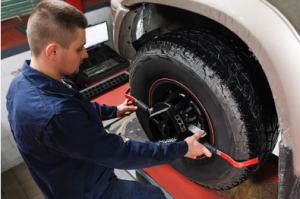Plug and play 4WD tuning Adelaide kits are designed to fix performance and fuel economy issues without requiring a significant overhaul of the vehicle’s mechanical components. These systems include a ‘chip’ that piggybacks on the vehicle’s existing ECU. However, if your vehicle has a factory ECU, you must add a new wiring harness to fit the new kit. Nevertheless, the benefits of this approach are clear: better fuel economy and more efficient driving.
 Plug-and-play ‘Chips’
Plug-and-play ‘Chips’
Plug-and-play ‘Chips,’ also known as ‘plug-and-drive’ devices, are a great way to improve your 4WD’s performance without replacing your vehicle’s engine. These upgrades often include more than an improved tune; they’re essentially plug-and-play devices that piggyback on your existing ECU. To use a plug-and-play ‘Chips’ upgrade, you must ensure your car’s wiring harness is compatible with the new unit.
Luckily, several plug-and-play ‘Chips’ available will significantly increase your vehicle’s power and fuel efficiency. The Torq Power Module is an example of a plug-and-play ‘Chips’ product. It optimises the air-fuel ratio and can increase horsepower and torque while reducing fuel consumption. Moreover, it also helps you to tow heavier loads with ease. Its design is inspired by the look of snakeskin and is made from top-quality materials.
ECU remaps
If you’ve been contemplating 4WD tuning Adelaide, you’ve probably heard about ECU remaps. These upgrades replace the standard software in a 4WD computer and give it the performance it deserves. Diesel Performance Tune is a 4WD tuning Adelaide service provider that thinks ECU will help customers get the most out of their vehicles. And while the results vary, they generally improve fuel economy and performance.
ECU can improve the performance of any vehicle by up to 5%. These ‘Chips’ have many benefits, including increased fuel economy, power, and efficiency. They can either be installed by the owner or purchased from a 4WD tuning Adelaide service provider. Often, these ‘Chips’ come with a wiring harness to plug into your vehicle. However, because the tuning Adelaide specialists use these ‘Chips’ specifically for your vehicle, installing them is a snap.
King Brown exhausts
If you want to improve your vehicle’s sound, you might want to check out a King Brown exhaust. King Brown makes exhaust systems for vehicles, including trucks, SUVs, and cars. Their systems are Australian-made and are made from stainless steel 409, which stretches with your vehicle and protects it from the elements. Since King Brown began building exhausts in South Australia more than 50 years ago, you can be sure they’ll work for you.
Diesel dyno tuning
Whether you’re after a customised diesel engine or want to get the most out of your 4WD, a diesel dyno tuning in Adelaide is an excellent choice. These services improve acceleration, throttle response, and gear changes while lowering fuel consumption and toxic emissions. For more information, contact a 4WD tuning centre today. They can answer any questions and help you get the most out of your vehicle.
Diesel ‘Chips’
If you’re looking to increase the speed and performance of your 4WD, you may want to consider adding diesel ‘Chips’. These minor modifications can increase horsepower and torque and can reduce engine rpm. They can also increase acceleration and speed and improve overtaking ability. And if you’re stuck in deep sand, a diesel ‘chip’ may be the perfect solution.
The downside to diesel performance chips is that they can increase wear on parts of the engine, which decreases the overall life of these components. A diesel performance chip will boost the power, but at the expense of other parameters, such as fuel economy. It’s not easy to determine which modifications are worth the cost. And while some vendors claim that their ‘chips’ can increase fuel economy by up to 30%, this isn’t true.
Diesel ‘Exhausts’
Regarding diesel engines, it’s always important to pay attention to ‘Exhausts’. Diesel exhausts have a distinctive smell and contain various organic and inorganic pollutants. The concentrations of these pollutants will vary depending on the fuel composition. For example, diesel exhausts produce more carbon than petrol. As a result, a diesel engine emits about 120 g of CO2 per kilometre, while petrol releases around 200 g.
Comments are closed, but trackbacks and pingbacks are open.